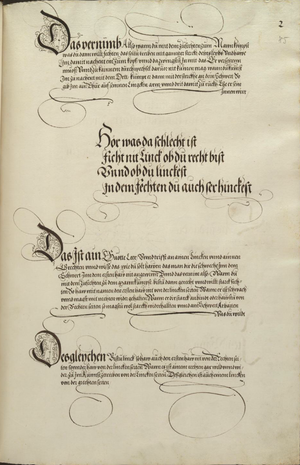|
|
You are not currently logged in. Are you accessing the unsecure (http) portal? Click here to switch to the secure portal. |
User:Kendra Brown/Latin Lew/Piece 007
Jump to navigation
Jump to search
Contents
Dresden
German
Transcription
[3] Desgleychen Bistuu linck so haw auch den ersten haw nit von der Rechten seiten. sonnder haw von der lincken seiten. Wann es ist ainem rechten gar wild vnnd wider/ zu Im kunnst zetreiben von der Lincken seiten. Deszgleichen ist auch einem lincken von der Rrechten seiten.
Sandbox German
- Des gleychen
- Bistu linck so haw auch den ersten haw nit von der Rechten seiten,
- sonnder haw von der lincken seiten,
- Wann es ist ainem rechten gar wild vnnd wider,
- Zu Im Kunnst zetreiben von der Lincken seiten,
- Deßgleichen ist auch einem lincken von der grechten seiten.
English
Sandbox English from German
- Likewise,
- if you are left-handed, then do not cut the first cut from your right side,
- but instead cut from the left side,
- because it is quite uncomfortable and contrary for a right-hander
- to practice the art from their left side.
- The same is also true for a left-hander from the right side.
Smooth English from German
Likewise, if you are left-handed, then do not cut the first cut from your right side, but instead cut from the left side, because it is quite uncomfortable and contrary for a right-hander to practice the art from their left side. The same is also true for a left-hander from the right side.
Munich
Latin
Transcription
[3] Sin autem sinistra manus dextra sit agilior, etiam tunc primum Ictum de latere dextro non feries, at potius de sinistro.
Sandbox Latin
- **Sin** autem sinistra manus dextra sit agilior,
- etiam tunc primum Ictum de latere dextro non feries,
- at potius de sinistro.
English
Sandbox English from Latin
- But if, however, the left hand is more dexterous than the right,
- Then also do not strike the first strike from the right side,
- But preferably from the left.
Smooth English from Latin
Placeholder text
Notes
- The Latin is more specific about handedness when discussing the left hand.
- Translating both ictus (noun) and feries (verb) as "strike" is a little weird, since they're not at all the same in Latin, but this is only really a problem when they're both in the same sentence.
- Note that 81v a says "more skillful striking from the right" where 81v b says "if the left hand is more dextrous than the right"
- Could these distinctions about handedness be about but the mechanics your opponent can interact with rather than the strength of the strike itself? see "you can stoutly resist"
- DMLBS may support the idea that indes could come from intus:
- Grimm suggests interea as a Latin translation for indes
- https://logeion.uchicago.edu/interea
- Grimm: http://woerterbuchnetz.de/cgi-bin/WBNetz/wbgui_py?sigle=DWB&mode=Vernetzung&lemid=GI00336#XGI00336
- als temporales adverb, das innerhalb einer vorher genannten zeit geschehene zu bezeichnen
- As a temporal adverb, which designates an occurrence within a previously mentioned time

